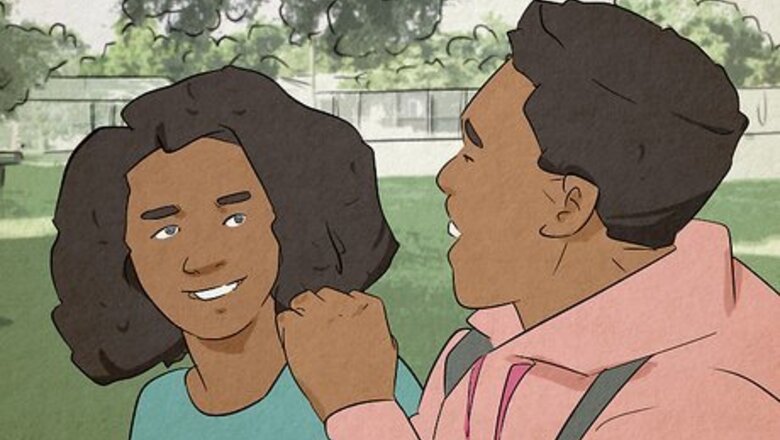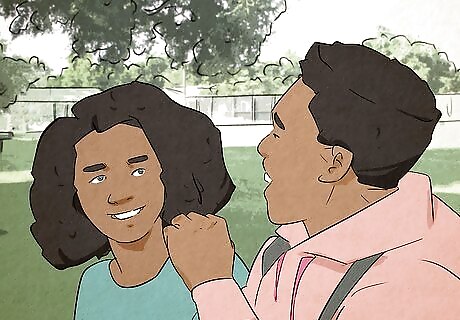
views
Adulting

Adulting means doing the tasks that come with being a grown-up. Millennials often use this term in a humorous way to poke fun at themselves for successfully completing adult tasks, like calling the doctor’s office to make an appointment, or setting up auto-pay so all their bills get paid on time. The term may also be a nod to the fact that members of the millennial generation tend to reach adult milestones (such as having children or getting married) a bit later in life than earlier generations did. “I wanted to go out and have fun, but I spent the whole weekend doing laundry, grocery shopping, and cleaning the apartment before the work week. Adulting is so hard!” “I’ve totally been adulting lately. I started meal prepping, so I have home cooked food for dinner every night of the week. No more frozen meals or takeout for me!”
Bae
Bae is an affectionate way to refer to your significant other. It’s comparable to terms of endearment like “sweetheart” or “honey.” Some people think “bae” is a shortened version of “babe” or “baby,” and others think it is an acronym for “before anyone else.” Either way, it’s a sweet, loving way to address someone you love! Here are some examples: “Thank you for a perfect date night! I love you, bae ????????” “I’m so sorry, but I can’t make it Saturday. My bae and I are going out of town to celebrate our anniversary.” “She and I have been best friends for years, and I trust her with my life. That’s my bae forever.”
Extra
Extra means over-the-top or extravagant. When someone is being “extra,” they’re doing too much or being too extreme. This term is often used to casually poke fun at someone for being a bit too excessive about something. “I love him, but he’s so extra. Every minor inconvenience becomes a major catastrophe, and he gossips about everyone. He absolutely lives for the drama.” “I get that she wanted to have a good time on her birthday, but she was being so extra. She expected everyone to drop everything and attend celebrations all week, as if we don’t have other responsibilities!”
Lit
If something is lit, it’s super fun or exciting. Like similar slang terms “turnt up” or “popping, “lit” essentially means that you’re hyped up about something. For example, “This party is so lit! I’m so glad I came.” Lit can also mean being intoxicated or drunk: “Ugh, I got way too lit last night. I’m so hungover this morning.”
Low-Key
Low-key means laid back or easygoing. If something is low-key, it's understated and chill, rather than intense and upbeat. For example, a casual get together of a few friends would be considered low-key. You can also use low-key to express an opinion in a restrained or subtle way: “I know I was the one who rejected him, but I low-key think he’s kind of cute now. If he asked me out again, I might say yes.” “My parents said we could have a kick back here this weekend, but we have to keep it low-key. 10 people at the most and no loud music after midnight.” “I low-key don’t get along with her. There’s nothing specific that happened, but I just don’t think we vibe.”
High-Key
High-key means “absolutely,” or “without a doubt.” Unlike the term low-key, high-key describes things that are intense or obvious. For example, “I saw her in the musical this weekend, and she was incredible. She’s high-key a star.” High key can also be used as a synonym for “very” or “totally” when expressing an opinion: “That movie was high-key terrible. I’m telling everyone I know that it’s not worth seeing.”
FOMO
FOMO is an acronym that stands for “fear of missing out.” When someone has FOMO, they’re afraid of missing out on a fun or exciting experience that other people are having. People often use the term to express sadness when they can’t make it to an event their friends or family are at. Here are some examples: “I’m so mad I have to work during the family brunch this weekend. I’m totally having FOMO!” “I can’t believe I’m sick and missing the party tonight. It looks so fun in the pics you guys are posting—I have such bad FOMO right now!”
Clapback
A clapback is a quick comeback to a criticism or insult. Clapbacks are usually witty, clever, or sassy. The term “clapback” can also be used as a verb, meaning to respond sharply and quickly to someone right after they’ve insulted you. Here are some examples in sentences: “So many trolls have been commenting negative things on your posts lately. You need to clapback and put a stop to this!” “She’s faced a lot of criticism from people, but she has the best clapbacks. Whenever someone insults her, they end up regretting it.”
Shook
Being "shook" means that you’re super shocked about something. People often use this term to describe their emotional state after experiencing something super surprising, jarring, or unsettling. It can also be used in both positive and negative contexts. For example: “I was so shook when I heard they broke up. I totally thought they were going to be together forever!” “That movie had me so shook. The ending twist was so insane—I literally couldn’t speak!” “When I won the award I was completely shook. I definitely thought it was going to be one of my coworkers, but I’m so thankful it was me.”
Basic
Basic means unoriginal, typical, or mainstream. Most often, the term is used as an insult to describe something that’s lame or overused (think pumpkin spice lattes, UGG boots, and Stanley cups). However, it can also be used to unapologetically declare that your love for mainstream things, even if they’ve been deemed “uncool.” For example: “I don’t care if UGG boots are basic. They’re literally the most comfortable shoes I own, and I wear them everywhere!” “I hopped on the bandwagon and bought a Stanley cup. I know they’re super basic, but I actually love mine so much.” “Every October, I start drinking a pumpkin spice latte every morning. I’m basic and proud.”
Glow Up
A glow up is an impressive makeover or personal transformation. Think Mia’s makeover in The Princess Diaries, or Andy’s glamorous wardrobe update in The Devil Wears Prada. The term “glow up” is often used to describe physical makeovers, but it can also be used to describe transformations in other areas of life (personal, professional, spiritual, etc). Here are some examples: I had such an awkward phase in high school, but I actually had a big glow-up in college and became super confident in myself.” “After her boyfriend ended things, she had a major glow-up. She started going to therapy and living a more balanced lifestyle, and she’s gained an insane amount of confidence. She’s literally thriving!” “He used to be a bit of a jerk, but he’s had a huge glow up recently. He’s super kind and mature now, and I think he’d make a great boyfriend.”
Humblebrag
A humblebrag is a modest comment that’s actually meant to invite praise. Humblebragging means making casual or self-deprecating comments about yourself in order to appear humble, but in actuality, you're drawing attention to your positive qualities or achievements. Here are a few examples of what humblebragging looks like: “I think my biggest weakness is that I’m too much of a perfectionist. If I’m going to do something, I can’t rest until it’s 100% flawless, which is really stressful.” “I feel like I was so unproductive this weekend. I mean, I cleaned my whole house, did all my laundry, and started on this big project with my husband in our yard, but those are all typical weekend chores.” “I was not super impressive in high school. I had a 4.0 GPA and was in the National Honors Society and stuff, but I didn’t do very many extracurriculars.”
Throw Shade
Throwing shade means subtly insulting someone. If someone throws shade at you, they’re trash talking or disrespecting you, but in an understated or unassuming way. The phrase originally gained popularity in Black and Latino LGBTQ ballroom culture, and it can be found in iconic media such as RuPaul’s Drag Race and the documentary Paris is Burning. “Her tweets didn’t directly name me, but anyone who knows the two of us would be able to tell she was throwing shade at me. I wish she would just talk to me directly so we can work this out.” “I couldn’t risk confronting him directly about his ridiculous behavior, but I did spend all afternoon throwing shade at him and giving him annoyed looks.”
Mood
If something is a mood, it’s super relatable. People usually use this term to express how deeply they resonate with a person, thing, or idea. For example, someone might say, “My dog has been alternating between eating and napping on the couch all day. He’s such a mood.” Here are some more examples: Person 1: “Look at this picture of my friend falling asleep in class.”Person 2: “Dude, that is mood af.” Person 1: “Instead of a big party on her birthday, she just wants to have a cozy night in our pajamas with pizza and wine.”Person 2: “Big mood! I’m so in.”
Vibe
A “vibe” is the mood or energy that something gives off. It can be used in a positive context (“Oh my gosh, this café is such a vibe. I love the decor!”) or a negative context (“I don’t know him that well, but he has a bad vibe. I don’t trust him.”) There are several variations of this term, including “It’s a vibe,” which means that something is cool or fun, and “vibe with,” which means that you enjoy someone's company. Here are some examples: “There was a great vibe at the party this weekend. Everyone had such a good time!” “Your outfit is such a vibe. You look amazing!” “I really vibe with him! We had a great date this weekend, and I definitely think I’ll see him again.”
Bet
“Bet” expresses affirmation or agreement with something. It essentially means “cool,” “for sure,” or “I’m down.” Here’s an example of the term “bet” in conversation: Person 1: “Hey, are you free to study after school today? My mom can make snacks!” Person 2: “Yeah, that sounds great! I can come over at 4:00 if that’s cool.” Person 1: “Okay bet! That sounds perfect.”
Fire
If something is fire, it’s amazing, impressive, or on point. This versatile slang word can be used to describe everything from delicious food to great music. You might also be familiar with “straight fire,” a popular variation of this term that has the same meaning. “This sushi is straight fire! I’m so glad this place opened.” “Dude, the new album is fire. I can’t stop listening to it.” “Your outfit is literally fire ???? He won’t be able to keep his eyes off you tonight!”
Slaps
If something slaps, it’s amazing or excellent. Like “fire,” this term is often used to praise yummy food and great music. For example, “This pizza slaps. I was so hungry, and I’m literally in heaven right now.” Or, “Turn up the speaker! This song slaps so hard. It’s my go-to when I want to put myself in a good mood.”
Fam
Fam (short for family) is an affectionate way to refer to close friends. The term basically means that you consider people to be your family even if they don’t share your blood. For example, if you have a group text with your besties, you could send a message that reads: “Okay fam! What are we doing this weekend? Any fun ideas?” The term can be used to refer to a singular person (“Hey fam, are you feeling okay? Didn’t see you in class this morning”) or to a group (“Fam, let’s plan a girls trip this summer. It’s been too long”).
Thirsty
If someone is “thirsty,” they’re desperate for attention or approval. This term is typically used in a romantic or sexual context, and it's usually an insult. For example, “He is literally so thirsty! We went on one date and now he won’t stop texting me.” The term can also be used in a non-romantic context. For instance, “I know she’s trying to make it as an influencer, but she comes across as so thirsty in all her posts. It seems like she’s dying for everyone’s approval.”
Sus
Sus means “suspect” or “suspicious.” If someone is acting “sus,” they’re being super secretive or sketchy. This slang term gained popularity through the popular internet game “Among Us,” which involves unmasking an “imposter” among the other players. Here are some examples of “sus” in sentences: “My friends said they aren’t planning any surprises for my birthday, but everyone is acting super sus. I definitely think they’re up to something.” “Her boyfriend was acting sus, so she went through his phone. It turns out he was texting a bunch of other girls, so they broke up.” “We tried not to act sus when we were sneaking outside food into the movie theater, but they totally caught us and made us throw our stuff out.”
Salty
Salty means angry, hostile, or bitter. People generally use this term to refer to people who are acting upset after an embarrassing situation or a failure. For example, “Family game night was supposed to be fun, but my sister got so salty after losing all the games. She was in a bad mood the rest of the night.” “Don’t let his sassy comments get to you! He’s just salty because you got the promotion, and he thought he was going to get it.” “Ever since I pointed out that my teacher was wrong on that one test question, he has been so salty toward me. It’s not my fault he made that mistake!”
Flex
To “flex” means to show off, brag, or flaunt your success. This term could refer to one’s physical appearance, accomplishments, finances, or belongings. Here are some examples: “Ever since he got that raise at work, he’s been totally flexing. He keeps posting pictures of luxurious stuff he’s buying, like that showy sports car he just got.” “He was trying to flex on me by talking about all the girls who are interested in him, but it was such a turn off. He seems pretty full of himself.”
Receipts
Having receipts of something means you have proof or evidence. People often use this term to call someone out for lying about something. For example: “Don’t even try to say that you weren’t cheating. I have receipts—my friends saw you at the party and texted me pictures.” Here are a few more examples: “I promise, I told you that the appointment was at 11:00, not 1:00. Let me pull up my texts and show you the receipts.” “I know she’s going to say that I lied to her, but I didn’t. I took screenshots of the entire conversation so that I’d have receipts.”
Stan
A stan is an extremely devoted fan. In a positive context, this term could refer to someone who is super enthusiastic about a musician, actor, or celebrity. On the negative side, stans are sometimes seen as overly zealous or obsessive. “She’s a Game of Thrones stan. When the show was on TV, she threw themed watch parties every week, and her house is filled with GOT merch.” “I used to be a hardcore Lady Gaga stan. I went to a ton of concerts and only listened to her music.” “She used to stan One Direction to an unhealthy degree. She was totally obsessed with them.”
Ship
If you “ship” two people, you’re rooting for them as a couple. This term can refer to fictional characters (“They didn’t end up together, but I totally shipped Harry and Hermione in Harry Potter”), famous people (“I ship Taylor Swift and Travis Kelce together—they’re so cute!”), or even people you know in real life (“I’m trying to get my two best friends to date because they’re perfect for each other. I seriously ship them”).
Ghosting
Ghosting means abruptly cutting off contact with someone. It’s usually used in a dating context. For example, imagine that you’ve gone on a few dates with someone and it seems like things are moving forward. Then, out of nowhere, they stop responding to texts and you never hear from them again. This person has unfortunately “ghosted” you. Though this term is often used to describe dating and relationships, it can also be used in a non-romantic context. For example: “After my interview, that company completely ghosted me. They never gave me feedback, and they won’t answer my emails!” “Me and my ex friend were supposed to meet up for coffee, but I think she’s ghosting me. She hasn’t replied to my last few texts about scheduling a time.”
GOAT
GOAT is an acronym that stands for “greatest of all time.” For example, you might say, “In gymnastics, Simone Biles is the undisputed G.O.A.T. No one else even comes close.” Or, “When it comes to modern pop stars, I think Beyoncé is the G.O.A.T. Her artistry and vocal ability are unmatched!” You can also use G.O.A.T. in more humorous contexts to refer to inanimate objects. For example, “Unpopular opinion, but I think honey mustard is the G.O.A.T. when it comes to condiments.”
YOLO
YOLO is an acronym that stands for “you only live once.” People often use this phrase to rationalize or justify impulsive behavior. It’s essentially a modern version of carpe diem. For example, “I should be studying tonight, but I couldn’t miss this concert. YOLO, I guess!” Here are some more examples: “I’m nervous, but I think I’m just gonna text him and ask him out. YOLO!” “I’ve been trying to save money, but honestly YOLO. I really want the new iPhone, so I’m just gonna buy it and hope for the best.”
On Fleek
On fleek means perfect or exactly right. For example, if someone’s makeup looks incredible, right down to the smallest detail, you might say, “Your makeup is on fleek!” Or, if you want to express your admiration of someone’s outfit, you could say, “Your outfit is on fleek today. Every detail is immaculate.”
Doggo

Doggo is an affectionate slang term for a dog. During the 2010s, Millennials popularized a whole system of slang words for their furry friends called “DoggoLingo.” This language included terms such as “pupper” (puppy), “bork” (bark), and “boop” (the act of tapping your dog on the nose).


















Comments
0 comment